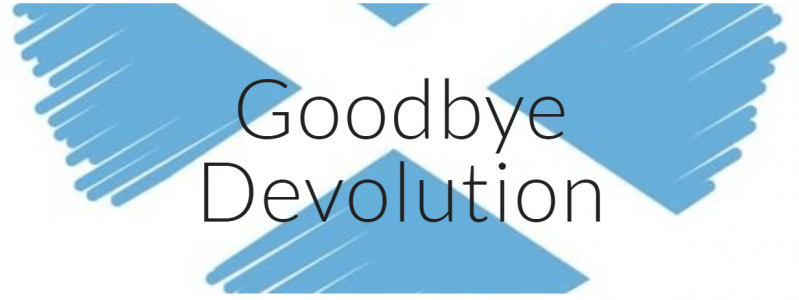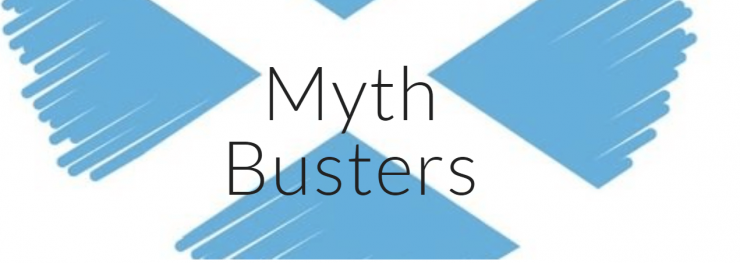
Goodbye Devolution
A Brief History: After the gerrymandered 1979 referendum we experienced 18 years of Tory rule which concentrated a lot of minds in Scotland and, when Labour came to power in 1997, under pressure from Europe, they agreed to hold another referendum on setting up a Scottish parliament. Over 70% said Yes to that parliament and the subsequent Scotland Act set it up in 1999. The Act identified a number of powers which would be reserved to Westminster but everything else came under the competence of the Scottish parliament. Part of the justification for devolution is to allow different solutions from what Westminster decides in order to fit with local circumstances.
The Tories had always opposed devolution so it was ironic that it enabled them to recover political representation in Scotland after their wipe-out in the 1997 General Election thanks to the proportional electoral system for the Scottish parliament. Since then some additional powers over income tax and over a small part of the welfare system have been given to Scotland but the promise made before the 2014 referendum to make the parliament permanent has not been kept. The Sewel Convention which said Westminster would 'not normally' legislate on devolved matters without the consent of the devolved legislatures has been shown to have no legal force when the UK Govt.(UKG) pushed through its Withdrawal Agreement Bill (Brexit) against the wishes of Holyrood, Cardiff and Stormont. In effect, therefore, it is as Enoch Powell observed, i.e. "power devolved is power retained".
Reneging on the Withdrawal Agreement: In September 2020 the UKG announced it would breach "in a precise and limited" way the international treaty it had made with the EU a year earlier and on which it had put the case which won it the G.E. of December 2019. To break international agreements like this is a very contentious thing to do for respecting the rule of law is fundamental in any democracy. The move has attracted widespread criticism from the EU as one would expect, from every living ex-PM concerned about the UK's trustworthiness in the eyes of the world, from many in the USA who see it as a threat to the Good Friday Agreement (GFA) and from the Irish who see it as likely to create a hard border between the Republic and N.I. It has led to the resignation of the UKG's top legal civil servant and of Lord Keen, the UKG's Advocate General for Scotland. (no friend of devolution, but someone who believes in the rule of law) So, why did the UKG take this step? To make way for its Internal Market Bill (IMB) and to ensure goods from N.I. have unfettered access to UK markets and to prevent EU state aid rules applying in the rest of the UK.
The Internal Market Bill: The justification for the IMB is that after the Brexit transition period is over on 31/12/20 it will be necessary to ensure seamless trade between the UK nations and avoid different regulatory regimes. At the heart of it is a 'mutual recognition' mechanism which would see regulations in one part of the UK recognised in all the other nations. It has been pointed out that currently trade within the UK is not hampered by different legislation in different parts of the UK, e.g. minimum alcohol pricing, but the Tories want the same rules everywhere and claim to do so would protect jobs. Up till now a number of devolved powers have been entrusted to Brussels but are in process of being returned. The UKG made it clear earlier this year that not all of these would return to the devolved parliaments and were accused of a power grab. The UKG counters by saying the great majority will go to Holyrood so it is actually a 'power surge'. The IMB takes this process further and that is why the devolved parliaments are saying not only is this a power grab but it threatens the whole concept of devolution because it will centralise control at Westminster and render the devolved parliaments so toothless that some could then say why have them at all. It is not just the Scottish Government (SG) which expresses these fears but also the Labour led Welsh Government , the N.I. government, many academics and many in the business world.
The bill contains what it calls two “market access principles”. The first is the principle of “mutual recognition”. The second, of “non-discrimination”. Mutual recognition means goods produced or imported into one part of the UK must be accepted all across the UK, even if they do not meet local standards. Non-discrimination is a bit more complicated but has perhaps even more far-reaching impact on devolution. (e.g. it would put paid to the Scottish policy on minimum pricing for alcohol). Who would decide on these matters? The UKG will appoint a Competition and Markets Authority, political appointees with no accountability to the SG, the Scottish Parliament or to Scotland. They will have the power to deny or contradict the budgets and decisions of every public organisation in Scotland, even on matters which had been devolved., even if those bodies feel their standards are being undermined. There are no prizes for guessing which country's standards and wishes will invariably prevail.
The SG's reaction is, “There isn’t the slightest doubt ... that this is a major power grab designed to undermine the existing devolution settlement ." Mark Drakeford, FM of Wales agrees. So who else is concerned?
- Food Standards Scotland: "these plans risk lowering standards." Scotland the Brand would also be threatened and markets would be lost because Scottish produce is marketed on quality grounds.
- Builders and architects: "Scotland has environmental protection and building regulation policies which are designed to reflect the distinct challenges of Scotland’s climate and its net-zero target. They risk being undermined."
- John Drummond of the Scottish Constitutional Commission has warned, “It’s exceptionally bad because what it means is that you can talk all you like in Edinburgh about the NHS and other devolved areas but a minister in London would decide what happens.
- Alison Johnstone of the Scottish Greens, "The UKG proposes it should have a veto over all devolved responsibilities. It tells us the NHS is safe but then voted down an amendment to the Trade Bill which would have protected health services across the UK from overseas control. The NHS in England has already been carved up and offered to private providers... but Scotland's NHS has been its own entity since 1947. In one vote that independence was undermined."
- Education: The General Teaching Council of Scotland demands that all teachers in Scotland are properly qualified The same does not apply in England.
Two clauses of the bill are especially threatening.
Clause 46 of the bill assumes budgetary power over a range of areas in Scotland, including: water infrastructure; roads and transport facilities; health and housing, all currently devolved. Clause 48 of the bill assumes powers over subsidies, undermining the work done by public agencies here in Scotland in providing financial support to businesses and organisations. Holding the purse strings on all these means the UKG can effectively dictate to the SG what it can and cannot do and will provide an argument to do away with the Barnett Formula.
Traditionally, the Scottish Secretary has been Scotland's man in the UK Cabinet but the last two, Mundell and Jack, have seen their role as propagandising the work of the UKG in Scotland. The Scotland Office is now called UKG Scotland. In the centre of Edinburgh is a new building ready to house 3000 civil servants. Apart from putting out propaganda, what will they do that could not be done by the Scottish Government's civil service?
In November 2020 Jacob Rees-Mogg accused the Blair government of "constitutional tinkering" in setting up devolution and called for "restoring our constitution to its proper form."( i.e. rule by Westminster)

